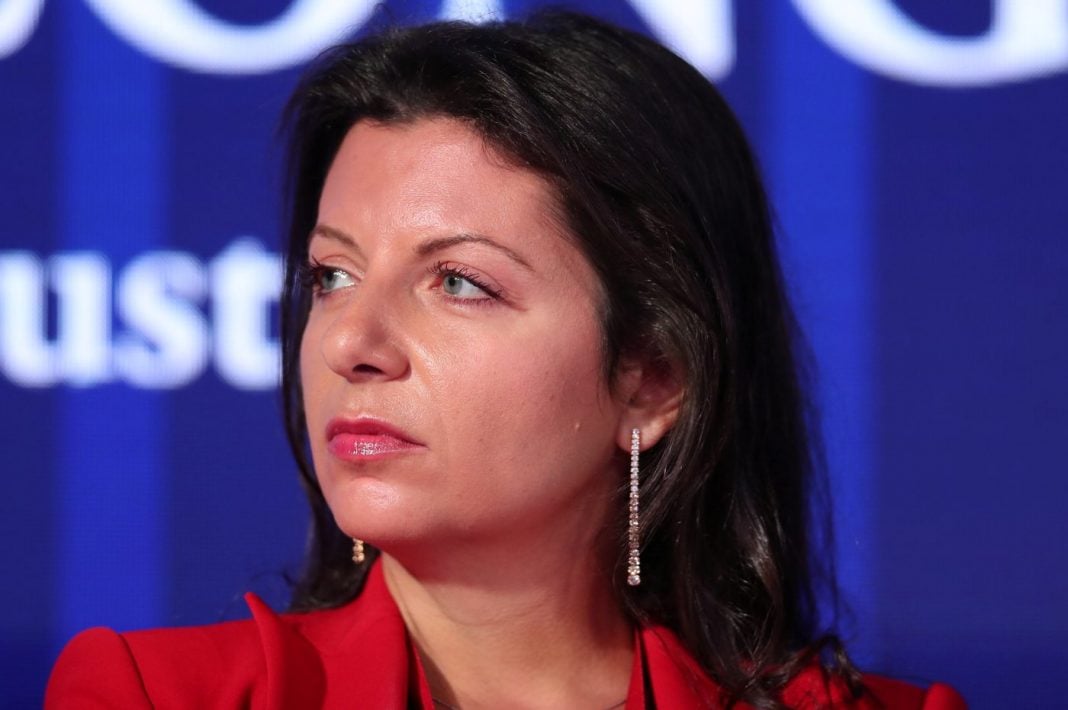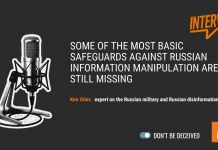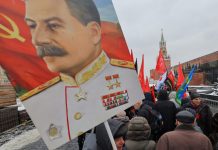By Julia Davis, for CEPA
The Kremlin’s mouthpieces once denied they were the regime’s playthings. No longer.
In the years preceding September’s US revelatory indictments against RT employees, the prominent Russian propagandist Margarita Simonyan often boasted about Russia’s covert operations in the United States when she appeared on state television.
After the veil was yanked off RT’s American storefront by the September 4 indictment, Simonyan dropped into Vladimir Solovyov’s show, Sunday Evening With Vladimir Solovyov, to emphatically declare that she would admit to nothing—but then cheerfully owned up to everything once again.
Simonyan explained: “When the special military operation started, everyone knows that our ability to work normally was shut down in all countries that support Ukraine. First of all, in the United States and in Europe, our broadcasting was stopped, our licenses have been revoked, you couldn’t transfer money, you couldn’t work there . . . They’ve decided that this way, we will shut up and leave. We can’t shut up and leave, our Motherland hasn’t given us the order to retreat.”
The RT boss explained that being unable to work in the West openly, Putin’s media troops had to resort to covert operations. She said: “In these countries, including the United States, we started to work undercover.”
Using the fashionable military lexicon that’s almost de rigueur in wartime Russia, Simonyan described RT’s efforts as “partisan warfare.” She said: “We organized a number of guerilla projects. I won’t say whether these are the projects of which the United States is currently accusing us . . . I won’t report about it to anyone except for our Supreme Commander-in-Chief, and he didn’t ask these questions.”
During the program, Solovyov and Simonyan proudly referred to themselves as “Putin’s soldiers” during a transparently self-serving segment no doubt designed to remind the boss of their productivity metrics.
But having said she would not discuss RT’s illicit US projects, she then boasted that they had “turned out to be incredibly successful.” Beaming, she said, “Our audience grew by leaps and bounds, compared to the time when we were openly broadcasting . . . Last year alone, our English-language projects got nearly 14 billion views.”
Other state TV propagandists were equally proud of RT’s operational successes in enemy territory. Henry Sardaryan, Dean of the School of Governance and Politics at MGIMO University, noted: “In the United States, in all seriousness, they discuss the fact that Russia has an enormous influence on their elections.
“Not so long ago, the way they perceived it, [Russia] was a breathless corpse that you could kick or poke with a stick, no one took it seriously. Turns out, the situation here isn’t nearly as bad.”
Simonyan complained that two of RT’s employees are also being charged with money laundering and that several people had their residences searched by US authorities. She thanked Maria Zakharova, the spokeswoman for the Ministry of Foreign Affairs, for helping to urgently “evacuate” them from America.
The RT boss said her US employees were told they’re facing 20 years in prison unless they cooperated with the authorities and claimed that the main question all of them were asked was whether they receive orders from the Kremlin.
She replied: “Listen, Comrades, do you think I’m getting orders from the CIA? Where else would I get my orders? I am the head of a Russian state media outlet that is funded by the government. I am proud that I work for my country! Write it down: all RT employees and its editor-in-chief follow only the orders from the Kremlin. Any other orders are being used as toilet paper.”
The extent of Kremlin control was laid out in detail by the OCCP and Proekt in 2019, with details of how Putin aides Alexey Gromov and Sergey Novikov oversee TV and print output and dictate the regime’s agenda to propagandists at weekly meetings. On occasion, they also threaten journalists who might say the wrong thing, Meduza reported. As in all dictatorships, the state and the media are indivisible although this was long denied by both.
Now there’s no need to hide its state activities. Solovyov, for example, openly worries that the regime’s favorites would be targeted. “I’m waiting for Jeffrey Sachs to be charged, for Tucker Carlson to be charged, for Judge [Andrew] Napolitano to be charged,” he said.
“Our colleague and friend Dimitri Simes and his wife are being accused of some unthinkable crimes and are being threatened with 60 years in prison for each of them. Can you imagine what they would do to Margarita [Simonyan] and her colleagues, who are of course terribly guilty? They are guilty of telling the truth to people all over the world,” Solovyov said.
RT’s operations are in fact designed to destabilize Western nations and make Russian propaganda acceptable. Simonyan previously admitted this in January, when she said on state television that RT works to “destabilize” the United States so that it “collapses that much sooner.” She proudly noted: “It’s what we’re striving for and succeeding, thank God.”
On September 8, Solovyov reconfirmed that this is indeed Moscow’s aim, when he exclaimed, “In the United States, they think we care about their elections. Idiots! What we care about is your civil war!”
By Julia Davis, for CEPA
Julia Davis is a columnist for The Daily Beast and the creator of the Russian Media Monitor. She is a member of the Academy of Television Arts and Sciences, the Screen Actors Guild, and Women In Film.
Europe’s Edge is CEPA’s online journal covering critical topics on the foreign policy docket across Europe and North America. All opinions are those of the author and do not necessarily represent the position or views of the institutions they represent or the Center for European Policy Analysis.





